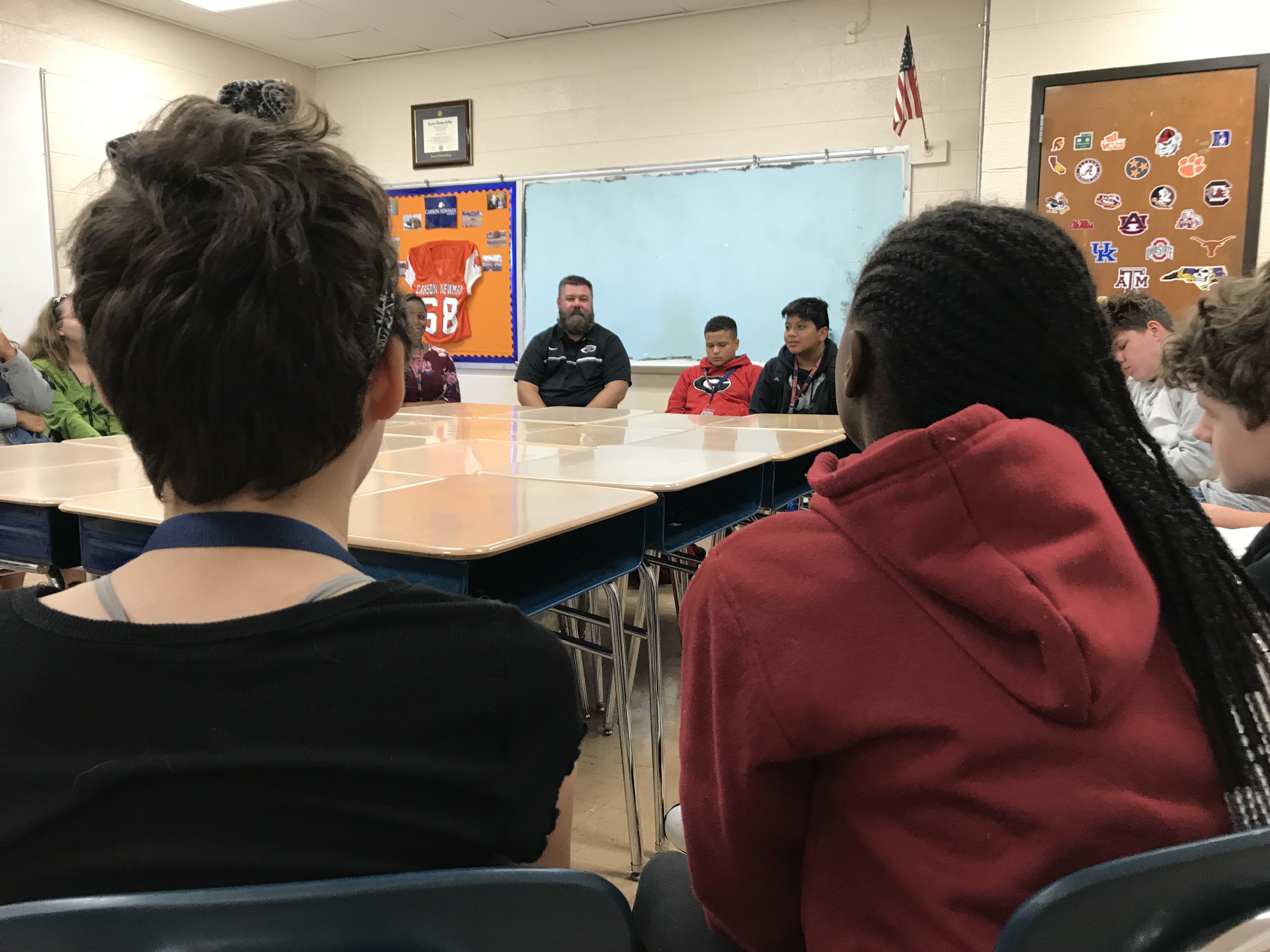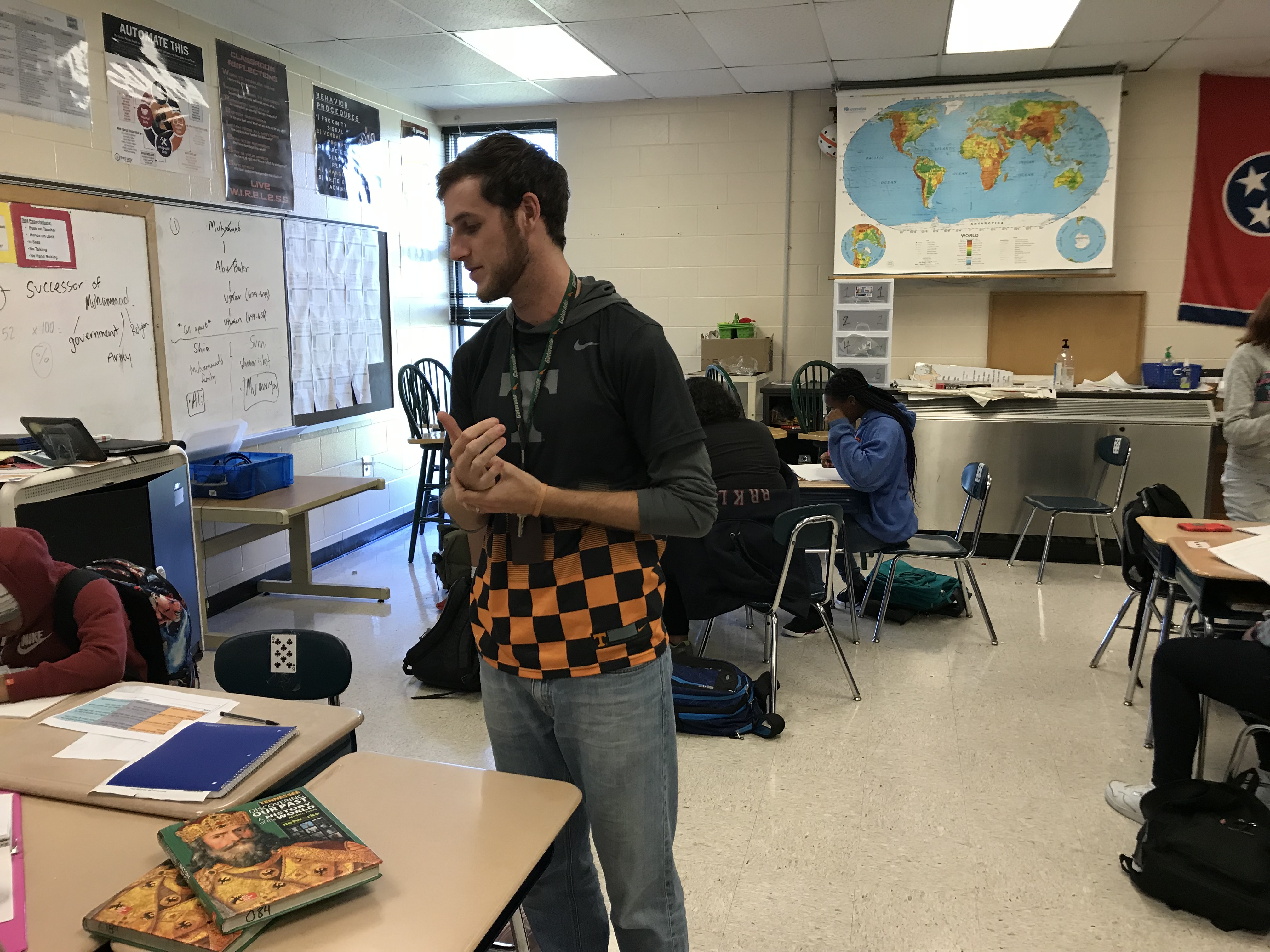-
Schools Aim To Support
Emotional Well-BeingPosted by Josh Flory on 10/29/2018 Northwest Middle School teacher Jason West leads a conversation circle on Oct. 19, 2018.
Northwest Middle School teacher Jason West leads a conversation circle on Oct. 19, 2018.Rows of desks are the stereotypical pattern for classroom seating, but on a recent afternoon at Northwest Middle School, some students had gathered in campfire-style circles instead.
In teacher Megan Smith’s 7th-grade classroom, students were tossing a plush emoji toy to each other, offering a compliment with each throw to the person who caught the toy.
A few steps down the hall, students in Jason West’s math class were having a discussion about what makes for a good school, a good classroom and a good teacher. Some answers were lighthearted -- at the suggestion of a class pet, West emphasized that a snake was out of the question.
But other answers were more thoughtful. Asked about effective teaching, students said the ideal teacher is funny but can be serious at the right times, and is someone who believes in their students.
The conversation circles are part of a broader push at Northwest to address Social and Emotional Learning (SEL), not only by building a family atmosphere within the school but also by equipping at-risk students with skills to process the challenges they may bring into the classroom.
Within the school’s xSEL Academy, students participate in a morning and afternoon conversation circle, which can include team-building exercises, ice-breaker questions and training on conversation skills such as making eye contact.
Tobi Kilgore, principal of the xSEL Academy at Northwest, said that if a student has experienced a trauma at home, it may be difficult to immediately move into their school work when they arrive in the morning.
“We’ve got to come in and really see what’s going on with them, check in with them, build that community with them, give them the supports and the nurture that they need, and then let’s start rolling into the academic piece,” he said.
Across the district, schools are working to meet that challenge, and last month several of them got a boost. The Tennessee Department of Education has launched a new training program aimed at creating “trauma-informed” schools, and seven KCS schools were included in the first training cohort.
Gwynetta Draper, high school special education supervisor for KCS, has gone through a version of the training, and said there seem to be more students coming out of environments that lack support systems.
“Families are more spread out,” she said. “Kids aren’t growing up in a neighborhood where they have three aunts and a grandparent looking out for them after school. I don’t know that we actually have more trauma in the world, although it certainly feels that way sometimes with instant access to news and social media, but the kids are coming to us from more stressful community environments.”
Draper said the training provides a framework for recognizing where students and their behaviors are coming from. While the training is not a magic fix, she said, the knowledge “can change the way you react to a child who looks like they’re just being defiant. Or we say they’re lazy or unmotivated when actually they are just unable to access educational instruction at that point in time. But recognizing where they’re coming from changes the way we interact and offer supports.”
To that end, one of the key principles of a trauma-informed approach is setting aside the mindset of “What’s wrong with you?” in favor of asking “What happened to you, and how can I help?”
Diana Gossett, principal of the Ridgedale Alternative School, said research has shown that ongoing exposure to trauma -- including abuse, neglect and poverty -- affects a child’s ability to make educational progress.
Ridgedale has a middle-school program for students who have received a long-term suspension from their traditional school, as well as a program for special education students with disabilities or behavioral issues.
Many of the middle-school students come to Ridgedale because of a discipline issue, “but when we get them we realize it’s more than a discipline issue,” Gossett said. “It’s that they don’t have good social-emotional skills, they don’t have good coping skills to manage their anger or manage their stress or manage their anxiety about whatever it is.”
The trauma-informed training will begin next month, with a handful of teachers from seven Knox County schools -- Beaumont Magnet Academy, Dogwood Elementary School, Northwest Middle School, Austin-East Magnet High School, Bearden High School, Richard Yoakley School and Ridgedale Alternative School.
Participating teachers will serve as trainers within their schools to educate their colleagues about trauma-informed practices.
Pat Conner, of the Tennessee Department of Education, said another key focus of the training will be helping teachers and administrators to care for themselves. “It’s kind of like the oxygen mask theory on the plane,” she said. “I can’t help you until I put on my oxygen mask first.”
At Northwest Middle, the focus on social-emotional learning is already having an impact. Braylin Thompson, an 8th grader at the school, said he’s come to realize how many people care about him, in part because they would come up and talk to him when he was alone.
Onna Winton, also an 8th-grader, said the focus on conversations has helped her understand how to disagree with someone, a lesson that was reinforced during a class discussion about the French and Indian War.
If you talk over someone, she said, “that just starts a whole bunch of conflict. If you’re talking over somebody, you’re just yelling across the room, it’s going to be horrible.”
Winton said she’s also learned about setting goals, including her aim to leave frustrations in the past rather than letting them drag her down. In fact, Winton said, she put that goal into practice recently -- after struggling on a math test, she was able to set the disappointment aside and go into Riley Scheyder’s social studies class with a smile.
Scheyder, a third-year teacher at Northwest, said he sometimes clashed with teachers when he was in school, and would have benefited from learning how to process conflict.
“A lot of our students are implicitly taught to keep something in or to explode, just based on how things are dealt (with),” he said. “Where if you can teach them to … process something and be vulnerable enough to share it out, even with just a neighbor who’s a surface-level acquaintance, or a best friend, then you’re able to process those other deeper moments, too.”
 Northwest Middle School teacher Riley Scheyder visits with students on Oct. 19, 2018.
Northwest Middle School teacher Riley Scheyder visits with students on Oct. 19, 2018.
Select a School...
Select a School
- A.L. Lotts Elementary (es)
- Adrian Burnett Elementary School (es)
- Amherst Elementary School (es)
- Austin-East Magnet High School (hs)
- Ball Camp Elementary School (es)
- Bearden Elementary School (es)
- Bearden High School (hs)
- Bearden Middle School (ms)
- Beaumont Magnet Academy (es)
- Belle Morris Elementary School (es)
- Blue Grass Elementary School (es)
- Bonny Kate Elementary School (es)
- Brickey-McCloud Elementary School (es)
- Career Magnet Academy (hs)
- Carter Elementary School (es)
- Carter High School (hs)
- Carter Middle School (ms)
- Cedar Bluff Elementary School (es)
- Cedar Bluff Middle School (ms)
- Cedar Bluff Preschool (p)
- Central High School (hs)
- Chilhowee Intermediate School (es)
- Christenberry Elementary School (es)
- Copper Ridge Elementary School (es)
- Corryton Elementary School (es)
- Dogwood Elementary School (es)
- Dr. Paul L. Kelley Volunteer Academy (hs)
- East Knox County Elementary School (es)
- Fair Garden Family Center (p)
- Farragut High School (hs)
- Farragut Intermediate School (es)
- Farragut Middle School (ms)
- Farragut Primary School (es)
- Fort Sanders Ed. Development Center (p)
- Fountain City Elementary School (es)
- Fulton High School (hs)
- Gap Creek Elementary School (es)
- Gibbs Elementary School (es)
- Gibbs High School (hs)
- Gibbs Middle School (ms)
- Green Magnet Academy (es)
- Gresham Middle School (ms)
- Halls Elementary School (es)
- Halls High School (hs)
- Halls Middle School (ms)
- Hardin Valley Academy (hs)
- Hardin Valley Elementary School (es)
- Hardin Valley Middle School (ms)
- Holston Middle School (ms)
- Inskip Elementary School (es)
- K.A.E.C.
- Karns Elementary School (es)
- Karns High School (hs)
- Karns Middle School (ms)
- Karns Preschool (p)
- L&N STEM Academy (hs)
- Lonsdale Elementary School (es)
- Maynard Elementary School (es)
- Mill Creek Elementary School (es)
- Mooreland Heights Elementary School (es)
- Mount Olive Elementary School (es)
- New Hopewell Elementary School (es)
- Northshore Elementary School (es)
- Northwest Middle School (ms)
- Norwood Elementary School (es)
- Pleasant Ridge Elementary School (es)
- Pond Gap Elementary School (es)
- Powell Elementary School (es)
- Powell High School (hs)
- Powell Middle School (ms)
- Richard Yoakley School
- Ridgedale School
- Ritta Elementary School (es)
- Rocky Hill Elementary School (es)
- Sarah Moore Greene Magnet Academy (es)
- Sequoyah Elementary School (es)
- Shannondale Elementary School (es)
- South Knoxville Elementary School (es)
- South-Doyle High School (hs)
- South-Doyle Middle School (ms)
- Spring Hill Elementary School (es)
- Sterchi Elementary School (es)
- Sunnyview Primary School (es)
- Vine Middle Magnet School (ms)
- Knox County Virtual School (hs) (es) (ms)
- West Haven Elementary School (es)
- West High School (hs)
- West Hills Elementary School (es)
- West Valley Middle School (ms)
- West View Elementary School (es)
- Whittle Springs Middle School (ms)

